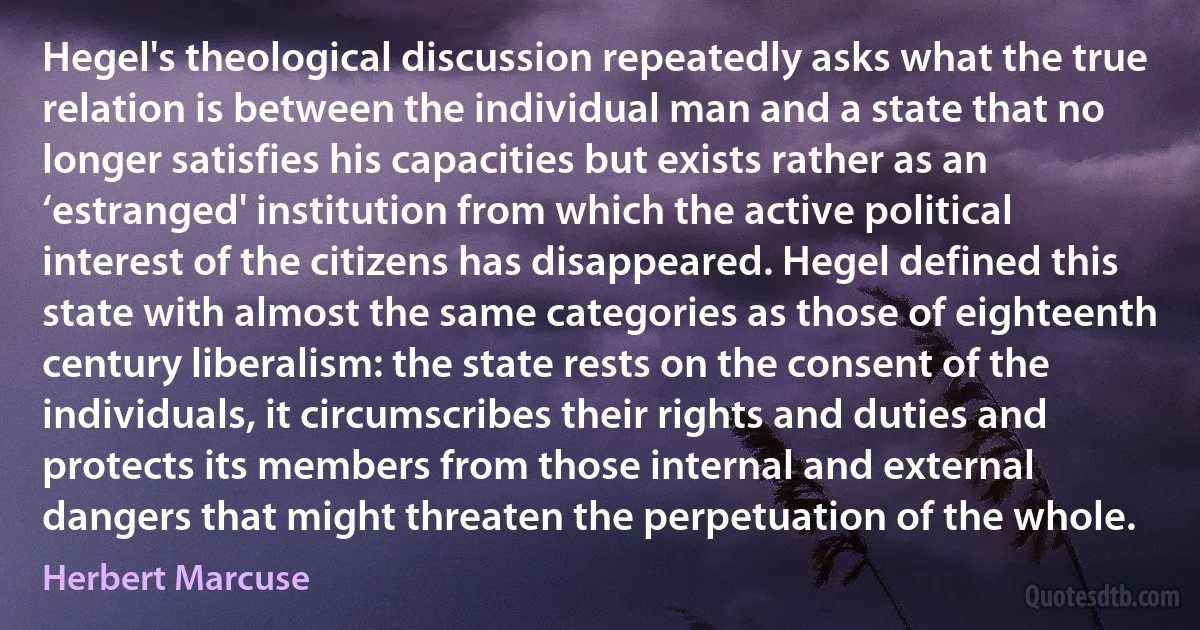
Hegel's theological discussion repeatedly asks what the true relation is between the individual man and a state that no longer satisfies his capacities but exists rather as an ‘estranged' institution from which the active political interest of the citizens has disappeared. Hegel defined this state with almost the same categories as those of eighteenth century liberalism: the state rests on the consent of the individuals, it circumscribes their rights and duties and protects its members from those internal and external dangers that might threaten the perpetuation of the whole.
Herbert MarcuseRelated topics
almost century consent eighteenth institution interest liberalism longer man might perpetuation state hegelRelated quotes
A reconsideration of the discussion in which I took an active part more than 40 years ago has left me with a rather depressing view of the somewhat shameful state of what has become an established part of economic science, the subject of 'economic systems'. It appears to me that in this subject political attractiveness has been preserved by the flimsiest of arguments. The kindest thing one can say is that some well-meaning people have allowed themselves to be deceived by the vague and thoughtless language commonly used by specialists in the theory of these issues.

Friedrich Hayek
Totalitarianism no longer comes in the form of communism or fascism. It comes now from corporations. And these corporations fear those who think and write, those who speak out and form relationships freely. Individual freedom impedes their power and their profits. Our democracy, as Snowden I think has revealed, has become a fiction. The state, through elaborate forms of political theater, seeks to maintain this fiction to keep us passive. And if we wake up, the state will not shy away from draconian measures. The goal is complete subjugation, the iron rule of our corporations and our power elite.

Chris Hedges
Only within the 20th Century has biological thought been focused on ecology, or the relation of the living creature to its environment. Awareness of ecological relationships is - or should be - the basis of modern conservation programs, for it is useless to attempt to preserve a living species unless the kind of land or water it requires is also preserved. So delicately interwoven are the relationships that when we disturb one thread of the community fabric we alter it all - perhaps almost imperceptibly, perhaps so drastically that destruction follows.

Rachel Carson
There's one uneasy borderline between what is external and what is internal, and this borderline is defined exactly by the sense organs and the skin and the introduction of external things within my own body. Consciousness is altered by physical events and physical objects, which impinge upon my sense organs, or which I introduce into my body.
Now the name traditionally given to external objects or processes which change you internally is sacrament. Sacraments are the visible and tangible techniques for bringing you close to your own divinity.

Timothy Leary
Both men and women are conceived as merely capable of response to a situation that their society has already defined for them as sexual, and so the Arapesh feel that it is necessary to chaperon betrothed couples who are too young... with their definition of sex as a response to an external situation rather than as spontaneous desire, both men and women are regarded as helpless in the face of seduction. Parents warn their sons even more than they warn their daughters against permitting themselves to get into situations in which someone can make love to them.

Margaret Mead
